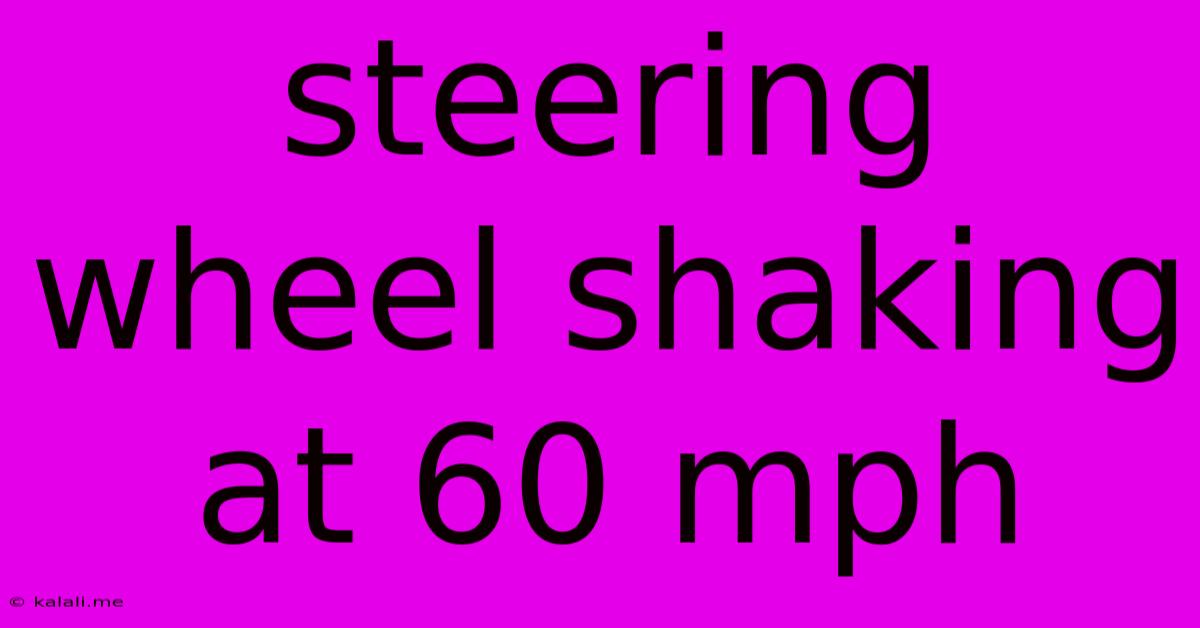Steering Wheel Shaking At 60 Mph
Kalali
Jun 09, 2025 · 3 min read

Table of Contents
Steering Wheel Shaking at 60 mph: Diagnosing and Fixing the Wobble
A shaking steering wheel at 60 mph (or any speed) is more than just an annoying vibration; it's a potential safety hazard. This unsettling wobble can indicate a problem with your vehicle's suspension, tires, or even the wheel alignment. This article will guide you through the common causes of this issue and provide actionable steps to diagnose and potentially resolve the problem. Understanding the root cause is crucial for ensuring a safe and comfortable driving experience.
Why is my steering wheel shaking at 60 mph? This is a common question among drivers, and several factors can contribute to this problem. The most frequent culprits are tire-related issues, but problems with your wheels, brakes, and suspension components should also be considered.
Common Causes of Steering Wheel Shake at 60 mph
-
Wheel Balance: This is often the most frequent cause. An imbalance means the weight distribution around the wheel isn't uniform, leading to vibrations that increase with speed. Even a small imbalance can cause a noticeable shake at higher speeds like 60 mph. This is easily checked and corrected by a tire professional.
-
Tire Tread Wear: Uneven or excessive wear on your tires, especially cupping or feathering, can cause vibrations. Check your tires for irregularities; uneven wear patterns should be addressed by a tire specialist. Consider tire rotation schedules as preventative maintenance.
-
Bent Wheel or Rim: A bent wheel, often caused by hitting a pothole or curb, will throw off the balance and cause significant shaking. This requires wheel repair or replacement. Inspect your wheels carefully for bends or cracks.
-
Warped Brake Rotors: Warped brake rotors are another potential source of vibration. As the rotors heat up and cool down, they can warp, leading to a pulsating feeling in the brake pedal and steering wheel, especially during braking at higher speeds. This usually requires rotor resurfacing or replacement.
-
Suspension Problems: Worn-out suspension components, such as ball joints, tie rod ends, or control arm bushings, can affect the alignment and stability of your vehicle, leading to vibrations. These components require professional inspection and replacement if necessary. Regular suspension checks are crucial for safe driving.
-
Wheel Alignment Issues: Misalignment can cause the tires to not track straight, resulting in vibrations and uneven tire wear. Professional wheel alignment is needed to correct this.
-
Driveshaft Problems: In some cases, issues with the driveshaft, such as a bent or worn U-joint, can contribute to vibrations. This is less common than the other causes but should be considered if other checks yield no results.
Diagnosing the Problem
Before taking your car to a mechanic, perform a few visual checks yourself:
- Inspect your tires: Look for uneven wear, bulges, or cuts.
- Check your wheels: Examine them for any bends or damage.
- Feel your brake rotors: If you can gently feel each rotor (when the car is safely parked and the brakes are not engaged), and notice a warped area, this may be an indication that rotors are warped.
Taking Action
If you've noticed a steering wheel shake at 60 mph, it's essential to address it promptly. Ignoring the problem could lead to further damage to your vehicle and potentially compromise your safety. A mechanic can accurately diagnose the cause through thorough inspection and testing. Remember to prioritize safety and seek professional assistance for any issues you can't diagnose yourself. Regular maintenance, including tire rotations, wheel balancing, and brake inspections, can help prevent these problems from occurring in the first place.
Latest Posts
Latest Posts
-
What Does Safe And Sound Mean
Jun 09, 2025
-
Multi Dimensional Feeling In A Picture
Jun 09, 2025
-
Electrical Wiring Diagrams Light Switch Outlet
Jun 09, 2025
-
Thema De Wordpres Auto Bumping O Auto Reposting
Jun 09, 2025
-
Wartales Can I Have Multiple Food Buffs At Once
Jun 09, 2025
Related Post
Thank you for visiting our website which covers about Steering Wheel Shaking At 60 Mph . We hope the information provided has been useful to you. Feel free to contact us if you have any questions or need further assistance. See you next time and don't miss to bookmark.